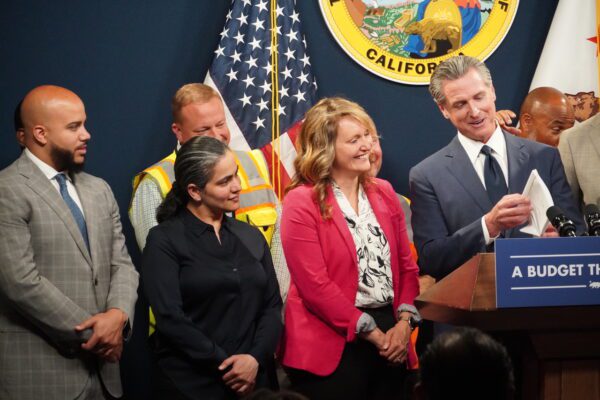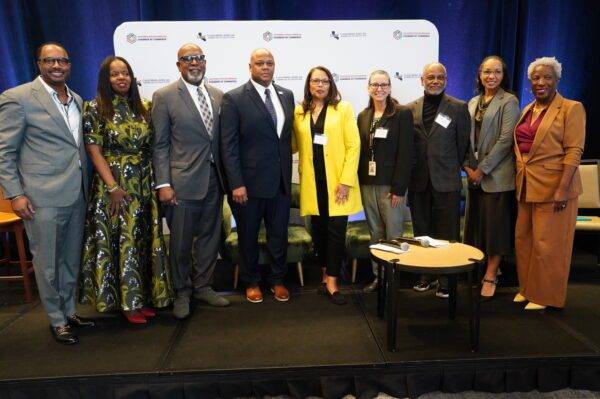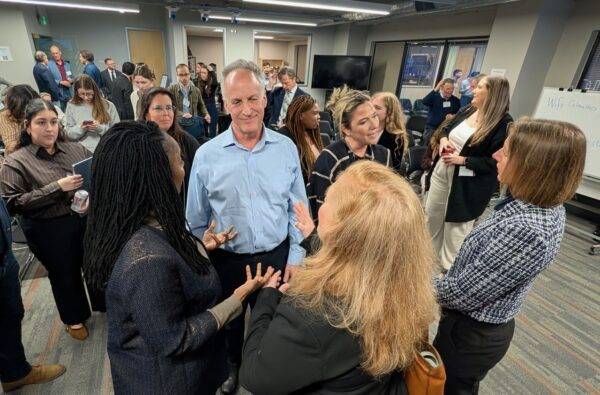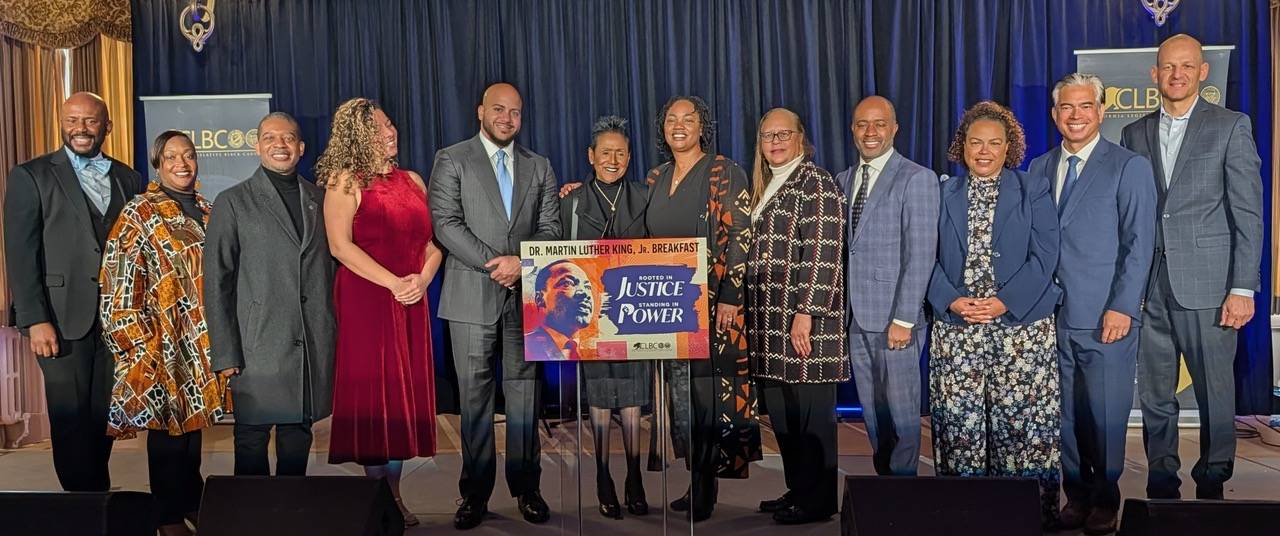A Big Win for Newsom on Housing: Gov Pushes Lawmakers to Loosen CEQA Restrictions
Last week, Gov. Gavin Newsom signed into law a housing reform package that scales back California’s landmark environmental law, a move he says is critical to easing the state’s housing shortage and homelessness crisis.
The two-bill package – containing Assembly Bill (AB) 609, authored by Assemblymember Buffy Wicks (D-Oakland), and AB 306 authored by Assemblymember Nick Schultz (D-Burbank) –reforms the California Environmental Quality Act (CEQA).
Until now, CEQA required environmental reviews for new development. Newsom and housing advocates say the law has delayed projects for years through costly lawsuits and reviews.
“We have too much demand chasing too little supply,” Newsom said June 30 in Sacramento. “This was too urgent, too important, to allow the process to unfold as it has for the last generation.”
According to the Governor’s office, the new law will speed up housing project approvals in dense urban areas and streamline reviews in an effort to lower construction costs and increase supply.
Gov. Newsom also signed Senate Bill 131, authored by Sen. Scott Wiener (D-San Francisco), along with budget trailer bill AB 130 –two measures that advance further reforms to the California Environmental Quality Act (CEQA). Supporters say the changes will help reduce costs for families.
Home prices in California remain among the highest in the nation, with the median price for a single-family home in San Jose surpassing $2 million last year.
“With AB 130, we’re taking a major step toward building desperately needed homes faster, fairer, and with more certainty,” Wicks said. “This is what our working-class families deserve and how we move California’s housing goals from promise to reality.”
Environmental groups, including the Sierra Club, opposed the legislation. Jakob Evans, a senior policy strategist with Sierra Club California, said the bills “will have destructive consequences for environmental justice communities and endangered species across California.”
With about 18 months left in office, Newsom is pushing to leave a legacy of progress on housing. When first elected, Newsom pledged to build millions of homes. That goal remains out of reach.
Planning expert Bill Fulton said it’s unclear how much development the law will actually unlock. “I think the increase will be incremental rather than a boom,” he said.
Republicans criticized Newsom for acting too late. “The governor has done very little. Now he wants to take credit for our work,” said Assembly GOP leader James Gallagher (R-Yuba City).
The housing overhaul comes as the state scales back other programs, including a health care expansion for undocumented immigrants, to close a $12 billion budget gap.
Newsom framed the move as a test of trust in government. “It’s about the reputation of the state of California,” he said.
Black Caucus Chair Weber-Pierson’s Reparations Bills Move Forward Amid Criticisms From Advocates
On July 1, the Assembly Judiciary Committee voted to pass two reparative justice bills authored by Sen. Akilah Weber-Pierson (D-San Diego): Senate Bill (SB) 437 and SB 518.
SB 518 and SB 437 were each approved by a 9-3 vote. The bills now advance to the Assembly Committee on Appropriations for review. The bills are part of the California Legislative Black Caucus (CLBC) Road to Repair 2025 Priority Bill Package.
“This is a critical responsibility and much-needed delayed step towards addressing enduring harms of slavery and systemic racism right here in California,” Weber-Pierson.
SB 437 addresses the process of determining eligibility for reparations for the descendants of enslaved people in the United States and the decades of discrimination that followed it. It also directs the California State University (CSU) to develop a research-backed methodology for validating lineage and descent.
Designed to implement recommendations from the California Reparations Task Force establishes the Bureau for Descendants of American Slavery within the Department of Justice (DOJ).
Chris Lodgson, lead organizer for the Coalition for a Just and Equitable California (CJEC) who testified in front of the committee, shared his displeasure with both bills.
CJEC is a California-based grassroots organization focused on achieving lineage-based reparations for African Americans.
“Both bills propose competing processes for genealogical verification, one through the DOJ and the other through the CSU,” Lodgson said. “So, which is it? This overlap only guarantees delay, bureaucracy, and confusion.”
During the hearing for the bill, a contentious debate about the rationale for using CSU and the process for determining lineage ensued but it didn’t appear to rattle Weber-Pierson.
“This bill (SB 518) established the infrastructure needed to move from recommendations to real implementation, ensuring that California leads with both accountability and action,” Weber-Pierson said.
Pres. Trump Signs “Big Beautiful Bill” Into Law; Gov. Newsom Newsom Calls Spending Bill “Betrayal” of California Families
Speaking at the White House, President Donald Trump signed his “Big Beautiful” spending plan into law on the Fourth of July.
“Our country has had so much to celebrate this Independence Day as we enter our 249th year, America is winning, winning, winning like never before,” said Trump before putting his signature on the legislation.
“It is the most popular bill ever signed in the history of our country,” according to Trump, predicting that the American economy will be a “rocket ship.”
“It includes the largest tax cut in American history. The largest spending cut — $1.7 trillion – and yet you won’t even notice it. It’s just waste, fraud and abuse.”
Gov. Gavin Newsom sharply criticized the Republican-led tax and spending law, calling it a “tragedy for the American people.”
“This bill is a tragedy for the American people, and a complete moral failure” said Newsom in a statement on July 3. “With this measure, Donald J. Trump’s legacy is now forever cemented: he has created a more unequal, more indebted, and more dangerous America. Shame on him.”
The bill would cut $28.4 billion from federal Medicaid support to California, putting health coverage at risk for millions and threatening the financial stability of hospitals and health clinics statewide. Newsom’s office estimates that 686,000 California jobs could be lost due to the rollback of clean energy tax credits.
The Governor also warned the bill would hit middle-class families by raising childcare costs, limiting access to financial aid for college, and cutting food assistance for 3 million Americans. More than 17 million people nationwide could lose health coverage by 2034 as a result of Medicaid and premium subsidy cuts.
“This measure cements Trump’s legacy,” said Newsom. “He has created a more unequal, more indebted, and more dangerous America.”
“Wrong Decision”: Former Sen. Bradford Questions Court Ruling Allowing Colleges to Pay Athletes Directly
Former California State Sen. Steven Bradford is speaking out against a recent federal court ruling that permits colleges to pay student-athletes directly, calling it a “wrong decision” that could have long-term consequences for college sports and education.
Last month, U.S. District Judge Claudia Wilken approved a landmark settlement in House v. NCAA, authorizing colleges nationwide to begin sharing revenue from their athletic programs with student athletes starting July 1. The ruling includes nearly $2.8 billion in retroactive payments to Division I athletes who competed between 2016 and the present. Going forward, schools will be able to distribute direct payments to athletes, with annual caps reaching approximately $20.5 million by the 2025–26 academic year.
Although hailed by some as a major step forward for athlete compensation, Bradford — who co-authored California’s historic Senate Bill (SB) 206, the first law in the nation to allow college athletes to profit from their name, image, and likeness (NIL) — voiced strong reservations.
“When Sen. Nancy Skinner and I introduced SB 206, our goal was to empower student athletes to negotiate directly with sponsors, endorsers, and companies – not to shift financial control to the colleges themselves,” Bradford told California Black Media (CBM).
“This ruling hands colleges too much power,” he continued. “It allows them to dangle carrots – to manipulate these athletes’ decisions about their education, future, and finances.”
Before the ruling, college athletes could only earn income through third-party NIL deals. These arrangements, often facilitated by donor-funded collectives, enabled top players to receive compensation without direct school involvement.
Under the new settlement, those payments must now be routed through official school channels, and endorsement deals involving boosters will be subject to review for legitimacy.
NCAA President Charlie Baker said the agreement brings clarity to athlete compensation and allows schools to regain control over the process. However, major questions remain unresolved — chief among them whether student athletes should be considered employees and given the right to unionize.
Bradford argued that positioning schools as the gatekeepers of athlete pay not only alters the educational environment but also deepens inequalities between institutions.
“Before, a local athlete could stay in their community, attend a nearby university, and still earn compensation,” he said. “Now, big-name schools with deeper pockets can lure them away with financial incentives. Why stay close to home when you can go with the highest bidder?”
Bradford warned that the new system risks undermining fairness and educational integrity in college sports.
“This makes student athletes more beholden to their universities than ever before,” he said.
Gov. Newsom’s 4th of July Message Shines Light on America’s Fight for Equality and Opportunity
In his proclamation declaring July 4, 2025, Independence Day in California, Gov. Gavin Newsom centered his message on equality, freedom and opportunity, reminding Californians that they have a stake in the fight to keep the dream of America alive.
The Governor said, since the founding of the country, “Americans have fought and died to safeguard the promise of our democracy and all its ideals.”
He also reminded Californians that America has not always guaranteed freedom and opportunity to all – and that it has taken sacrifice and determination to achieve the freedoms we celebrate on the Fourth of July.
“The struggles and triumphs of generations of Americans have continued our progress toward this goal, and the work is far from over,” he said. “Relentless attacks across the country, from the highest levels, try to weaken and erase our fundamental rights and freedoms, threatening to undo decades of hard-won progress we’ve made as a nation.
Newsom promised that California will never “back down from the fight to protect freedom.”
“We will protect the rights of all who call this country home, and we will never again allow this country and its people to be subject to a king or autocrat,” he said.
During the holiday weekend, the South Carolina Democratic Party (SCDP) announced that Newsom will be joining Palmetto State party leaders on July 8 and July 9 for a tour of parts of rural South Carolina.
“Governor Newsom leads the largest economy in America and the fourth largest in the world, and he’s coming to meet folks in towns that have been hollowed out by decades of Republican control,” said SCDP Chair Christale Spain in a statement.
“This is about building partnerships, uplifting communities, and showing rural voters that they aren’t forgotten,” Spain added.
“We Won’t Stand for It”: Tony Thurmond Blasts Trump Admin for Cutting $811 Million in Education Funds for California
California Superintendent of Public Instruction Tony Thurmond, flanked by education leaders in the state, held a news conference on July 1 to push back on federal government budget cuts to California totaling about $811 million.
Announcing that California and other states are suing the federal government for the education cuts, Thurmond called the cuts an “illegal action.”
“We won’t stand for it,” said Thurmond. “It will not happen on our watch.”
“The dollars the President and his administration have threatened to take back have already been approved by Congress,” continued Thurmond, who said he was speaking on behalf of the nearly six million students enrolled in California’s public schools and tens of millions more around the United States.
“The president cannot illegally withhold resources from students just as we are approaching the new year just because they do not align with his personal preferences — or to settle some political score,” said Thurmond.
Thurmond was joined on stage by the California School Boards Association (CSBA), the California Federation of Teachers (CFT), the California Association of School Business Officials (CASBO), SEIU Local 99 (Education Workers United) and the California County Superintendents (CCS).
Thurmond said the cuts will affect students in all communities and impact after-school and teacher training programs as well as technological support and hiring.
“On behalf of 5,500 school board members, the California School Boards Association urges the federal government to immediately release the billions of dollars in education funding that they promised to our schools in California,” said Patrick O’Donnell, Chief of Government Relations at CSBA. “Honor your commitment to students, to educators, to school board members, to administrators.”
Cal DOJ: Black Californians Disproportionately Impacted by Police Use of Force; 20% of Officers Involved Injured
Black Californians remain disproportionately impacted by police use of force, according to new data released by the California Department of Justice (DOJ) in its 2024 criminal justice statistical reports.
The “Use of Force Incident Reporting 2024” report revealed that while Black residents make up just 5.7% of the state’s population, they accounted for 19.4% of civilians involved in use-of-force incidents that resulted in serious injury or death, or the discharge of a firearm.
In contrast, Hispanic individuals represented 50.2% of such incidents, and White individuals accounted for 25.8%. Whites account for 34.7% of the state’s population and Latinos make up 40.3%
“Transparency is key for understanding, preventing, and combatting crimes in our communities. While crime rates have declined over the past year, public safety in our communities remains priorities one, two, and three. I encourage local partners and law enforcement to review this data and recommit to taking action,” said Attorney General Rob Bonta during a press conference held on July 1.
“The statistics reported today in the California Department of Justice’s annual crime reports are a critical part of understanding where we are, regulating our response, and ensuring policymakers and law enforcement have the tools they need to make informed decisions that keep millions of Californians safe,” he added.
In total, 581 incidents in 2024 involved serious bodily injury or death, or the discharge of a firearm by either a peace officer or civilian. The data shows 592 civilians, and 1,215 officers were involved in these incidents. While none of the officers died, 20% were injured.
Bonta emphasized that transparency remains essential in addressing public safety concerns.
“Understanding where we stand is key to making California safer and more equitable,” said Bonta. He urged law enforcement and community leaders to use the data to inform action and reforms.
The findings are part of a broader release of five annual reports, including statistics on crime, homicides, juvenile justice, and gun-related offenses. The DOJ has been working to improve data collection through the California Incident-Based Reporting System (CIBRS), aimed at providing more comprehensive insights into criminal justice trends.
Bonta encouraged the public to engage with the data to hold systems accountable and support informed policymaking.
The report also included data on “crime guns” and “juvenile justice.”
Article By: Antoniio Ray Harvey & Bo Tefu, California Black Media







